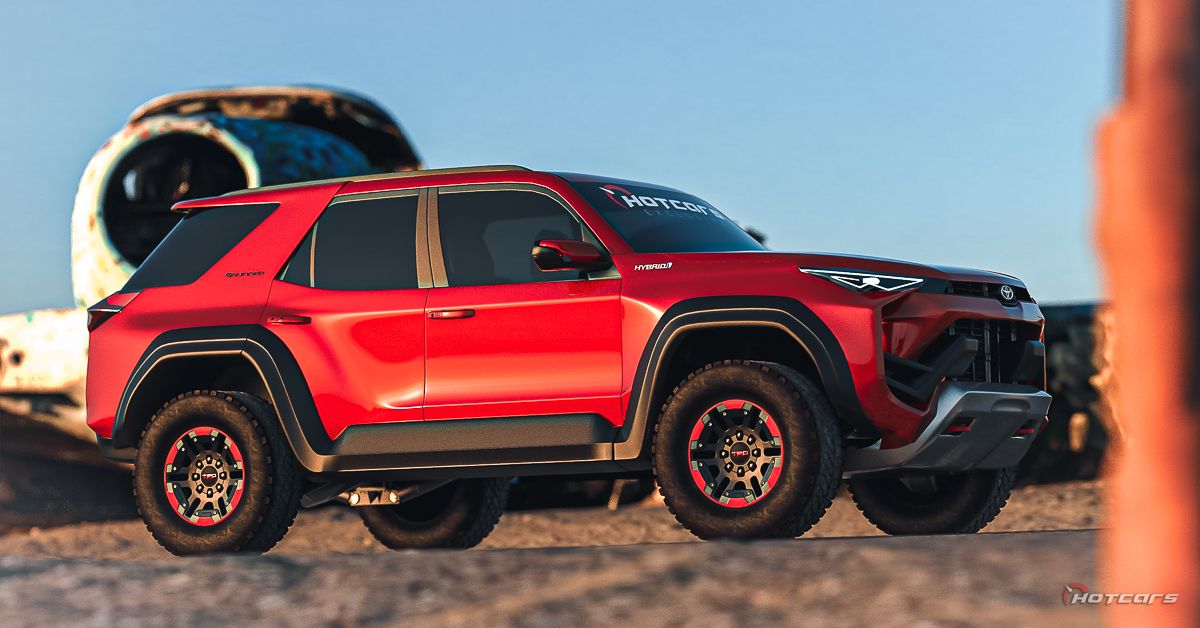The Future of Off-Road Adventure: Exploring the Potential of the Toyota 4Runner’s Fuel Efficiency
Related Articles: The Future of Off-Road Adventure: Exploring the Potential of the Toyota 4Runner’s Fuel Efficiency
Introduction
With enthusiasm, let’s navigate through the intriguing topic related to The Future of Off-Road Adventure: Exploring the Potential of the Toyota 4Runner’s Fuel Efficiency. Let’s weave interesting information and offer fresh perspectives to the readers.
Table of Content
The Future of Off-Road Adventure: Exploring the Potential of the Toyota 4Runner’s Fuel Efficiency

The Toyota 4Runner, a stalwart of the off-road world, has consistently delivered on its promise of rugged capability and adventurous spirit. However, in an era increasingly focused on environmental responsibility and fuel efficiency, the 4Runner’s thirst for gasoline has become a point of contention. As the automotive landscape evolves, speculation abounds regarding the 2025 model year and its potential fuel economy improvements.
While official specifications for the 2025 4Runner remain shrouded in secrecy, several factors suggest a potential shift towards enhanced fuel efficiency.
Technological Advancements:
The automotive industry is witnessing a rapid evolution of technologies designed to optimize fuel consumption. Hybrid powertrains, already prevalent in other Toyota models, represent a strong possibility for the 4Runner. Combining a gasoline engine with an electric motor could significantly enhance fuel economy without compromising the vehicle’s off-road prowess.
Furthermore, advancements in engine design, such as direct injection and variable valve timing, are continuously improving combustion efficiency and reducing fuel consumption. These technologies, combined with lightweight materials and aerodynamic optimization, could contribute to a more fuel-efficient 4Runner.
Market Trends and Consumer Demand:
The automotive market is increasingly receptive to vehicles that offer both performance and environmental responsibility. Consumers are actively seeking vehicles that minimize their carbon footprint without sacrificing the functionality and features they desire.
Toyota, known for its commitment to sustainability, is likely to respond to this growing demand by introducing fuel-saving innovations to its iconic 4Runner.
The Importance of Fuel Efficiency:
Improved fuel economy in the 4Runner offers a multitude of benefits:
- Reduced Fuel Costs: Lower fuel consumption translates to significant savings for owners, particularly in the long term.
- Environmental Impact: Enhanced fuel efficiency reduces greenhouse gas emissions, contributing to a cleaner environment.
- Increased Range: A more fuel-efficient 4Runner can travel further on a single tank of gas, making it more suitable for extended adventures.
- Enhanced Competitiveness: In a market increasingly focused on fuel economy, a more efficient 4Runner would be more competitive and appealing to a wider range of buyers.
Exploring Potential Scenarios:
While the exact fuel economy figures for the 2025 4Runner remain unknown, it is plausible to speculate on potential scenarios based on current trends and technological advancements:
- Hybrid Powertrain: A hybrid system could significantly improve fuel efficiency, potentially achieving a combined fuel economy of 25-30 mpg, a notable improvement over the current model.
- Engine Optimization: Optimizations to the existing engine, coupled with weight reduction and aerodynamic improvements, could result in a modest fuel economy increase, perhaps reaching 20-22 mpg.
- Mild Hybrid: A mild hybrid system, offering a smaller boost in fuel efficiency compared to a full hybrid, could be a more affordable option, potentially achieving 22-24 mpg.
FAQs about the 2025 Toyota 4Runner’s Fuel Economy:
- Will the 2025 4Runner have a hybrid powertrain? While Toyota has not officially confirmed the use of a hybrid system, the increasing popularity of hybrids and Toyota’s commitment to sustainability make it a strong possibility.
- How much will the 2025 4Runner’s fuel economy improve? The exact improvement is unknown, but based on current trends and technology, a significant increase is likely.
- Will the 2025 4Runner’s off-road capabilities be compromised by fuel economy improvements? Toyota is likely to prioritize maintaining the 4Runner’s off-road performance while implementing fuel-saving technologies.
- When will the 2025 4Runner be released? Official release dates are yet to be announced, but the 2025 model year typically arrives in late 2024.
Tips for Maximizing Fuel Efficiency:
- Maintain Proper Tire Pressure: Underinflated tires can significantly reduce fuel efficiency.
- Avoid Excessive Acceleration and Braking: Smooth driving habits contribute to better fuel economy.
- Regularly Service Your Vehicle: Proper maintenance ensures optimal engine performance and fuel efficiency.
- Consider Fuel-Saving Accessories: Accessories like roof racks and cargo boxes can increase drag and reduce fuel economy.
Conclusion:
The 2025 Toyota 4Runner promises to be a significant milestone in the evolution of this iconic off-road vehicle. The potential for enhanced fuel efficiency, driven by technological advancements and market trends, represents a positive step towards a more sustainable future for the 4Runner. While specific fuel economy figures remain unknown, the anticipation surrounding this new model year underscores the growing importance of fuel efficiency in the automotive landscape. The 2025 4Runner, with its blend of rugged capability and potential for improved fuel economy, is poised to continue its legacy as a symbol of adventure and environmental responsibility.








Closure
Thus, we hope this article has provided valuable insights into The Future of Off-Road Adventure: Exploring the Potential of the Toyota 4Runner’s Fuel Efficiency. We thank you for taking the time to read this article. See you in our next article!